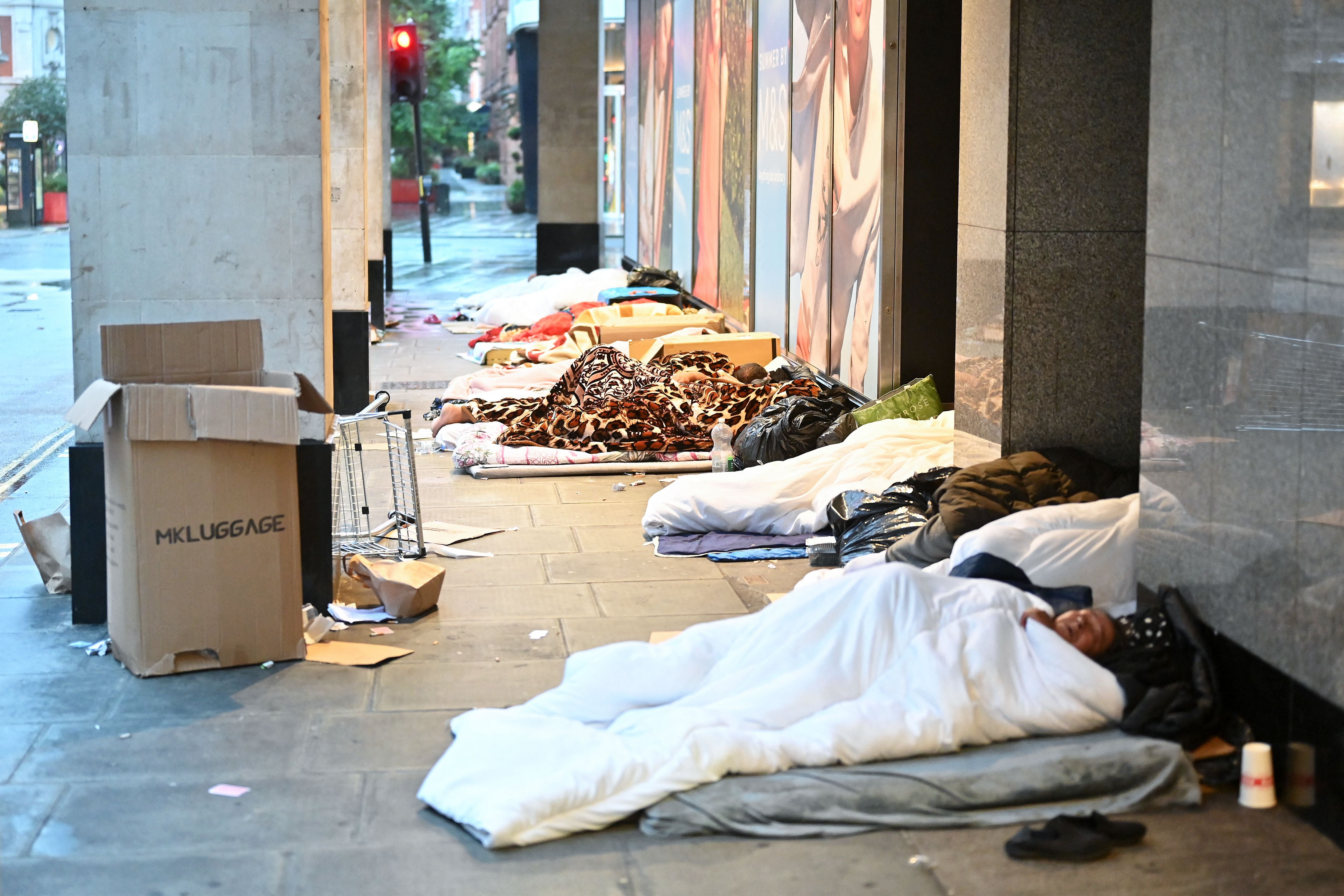Why are Tory MPs rebelling against the Criminal Justice Bill?
As dissent widens over the much-maligned legislation – a legacy of Suella Braverman’s time in office – Sean O’Grady looks at why MPs are taking a stand on an issue that could cause No 10 considerable embarrassment


The government is facing yet another political embarrassment in the coming weeks, this time a sizeable rebellion on its latest “law and order” bill. And the current Criminal Justice Bill is a very silly bill indeed, according to its critics, at least as it pertains to the difficult issue of rough sleeping.
As has been picked up by the press, it will criminalise “nuisance” rough sleeping, and allow the police to arrest someone if an “excessive” smell is coming from them or their makeshift bedding, or even if they look like they are preparing to sleep rough. A fine of up to £2,500 may be imposed if they refuse to move on. “Insulting words” are also actionable, even though the world of the rough sleeper isn’t well suited to polite discourse about their predicament.
Such odd, if not grotesquely cruel, clauses in the bill have understandably attracted cross-party opposition. The bill has made good progress through the House of Commons so far, but amendments will be tabled when the House returns from recess after 15 April, at the “report” stage. The Lords, a revising chamber designed to improve badly drafted legislation, may also take a view.
Why is the government doing this?
Think of it as Suella Braverman’s leaving present to the British people. Before she was sacked (for the second time) as home secretary last November, she made it her mission to sweep the homeless off the streets, and included suitably draconian measures in what was then “her” Criminal Justice Bill.
You may also recall the harsh determination she brought to her mission, expressed in a notorious tweet: “The British people are compassionate. We will always support those who are genuinely homeless. But we cannot allow our streets to be taken over by rows of tents occupied by people, many of them from abroad, living on the streets as a lifestyle choice.”
“Lifestyle choice” made it sound like kipping in a urine-soaked doorway in the middle of winter is the equivalent of a weekend at a health spa, and earned Braverman an unusual amount of scorn from those she would regard as “the right people” to be her enemies. “Cruella” was, and is, not without guile.
Even though Braverman has gone, the Criminal Justice Bill is her living legacy to her successor James Cleverly, and to the prime minister, both of whom could probably do without the hassle. It’s fair to say that’s also true of the hard-pressed police officers, not to mention the courts, that will soon have to deal with a long line of people tramping through the criminal justice system.
What’s the alternative?
Aside from just scrapping it, the Tory backbencher Bob Blackman has tabled an amendment to the bill that would make ministers issue sensible guidance to councils and the police. This would mean clarifying that begging or rough sleeping, in and of itself, does not amount to unreasonable conduct, and that the policing of such activities “should balance protection of the community with sensitivity to the problems that cause people to engage in begging or sleeping rough”.
The guidance would also make clear that police powers should not generally be used against people sleeping rough, only those who are begging – and only when no other approach is reasonably available to the authorities in question.
Will the rebellion succeed?
It looks quite a formidable one. There are about 10 Conservative MPs who have thus far indicated their intention to vote down the “arrest the homeless” clauses, and there are reported to be around 40 altogether. The dissidents are led by Iain Duncan Smith on the right, and Damian Green, figurehead of the One Nation group, on the Tory Left, which usually spells trouble for the whips.

Given the whittled-down Conservative majority (now down to 53), the number of sitting MPs about to retire or quit, and the general mood of dissatisfaction, a vote on the Criminal Justice Bill could be used as a discreet, tacit warning to Rishi Sunak about his leadership.
For the opposition, the resistance is being led by Liberal Democrat Layla Moran, who has long campaigned on the issue. Labour and the SNP (though the law doesn’t apply to Scotland) would be happy to see the government defeated.
Isn’t rough sleeping already illegal?
Yes. The Vagrancy Act of 1824 is still technically in force. It was promulgated to deal with the large number of soldiers returning from the Napoleonic wars, who, having fought for their king and country, were left destitute with nowhere to live – a familiar tale even now. It was hardly a success. Two centuries on, and ex-service personnel still account for too high a proportion of those living on the streets.
There was widespread consensus on abolishing the 1824 law, and parliament has agreed to do so, but no date has yet been set for its disapplication. The relevant clauses in the Criminal Justice Bill are supposed to replace it, but its opponents argue that they will make matters worse.
So don’t we need a law on ‘nuisance’ rough sleeping and begging?
Not necessarily; over recent decades, a plethora of laws have been devoted to antisocial behaviour, while the police can deal with criminal damage, obstruction and violence already.
There’s also the absurdity of trying to criminalise what is a social evil – it is like passing a law that renders being jobless an offence. It carries the implication that homelessness is, as Braverman put it, “a lifestyle choice” rather than a consequence of misfortune, ill health, family breakdown, addiction, or some other trauma. The housing crisis is an unpromising context for a drive to force the homeless to get a home.
It also brings the law into disrepute. If the police move someone on, where does that person go next? How many rough sleepers can afford a fine of £2,500? And who judges just how whiffy you have to be before you are detained? If the stench derives from a festering gangrenous wound, it seems a bit harsh to be arrested for it.
The magistrates might not appreciate having to administer their own “smell test” when the unfortunate vagabond presents themselves for inspection in court. Indeed, so strange is the smell test that even Gillian Keegan, the education secretary, seemed to consider that element of the legislation misjudged when she was asked about it on Sky News.
Maybe Sunak and Cleverly will change their minds, too, and find a way of quietly killing some of the bill’s more offensive, impractical provisions. Even if passed, the law may end up being ignored by police on the streets exercising their discretion.






Join our commenting forum
Join thought-provoking conversations, follow other Independent readers and see their replies
Comments